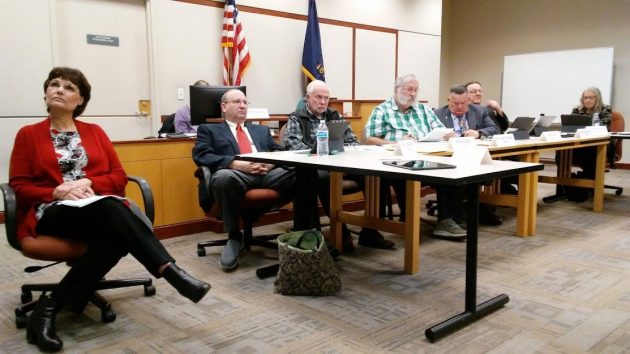
The Albany City Council at a work session on Dec. 3. Mayor Konopa is looking at an overhead screen.
The Albany City Council and one of the city’s employee unions have been unable to agree on a new labor contract providing, among other things, certain percentage increases in wages. News reports haven’t mentioned to what amounts the percentages would apply, so I asked.
At last report, the city’s final offer was for a four-year contract with these wage hikes: 2.5 percent as of last July 1, and then equaling the Consumer Price Index with a cap of 3 percent on July 1 of each of the next three years.
The union’s final request was for a three-year contract with wage boosts of 2.5 percent as of last July 1; then the CPI with a cap of 3 percent on July 1, 2019, followed by the CPI, but at least 2 percent and capped at 4 percent, on July 1, 2020.
So what, on average, are the current wage amounts to which those increases would apply?
The American Federation of State, County and Municipal Employees (AFSCME) represents 177 Albany city employees in what’s called the general unit and another seven employees in the transit unit, Danette Jamison, the city’s human resources director, told me last month. They include a wide variety of occupations, such as office administrative staff, engineers, planners, maintenance technicians, librarians, information technology staff, recreation coordinators, accounting specialists, and others.
Their mean or average monthly pay is $4,630.25 or $55,563 per year. The mean of their total monthly compensation including benefits is $7,700, or $92,400 per year.
The lowest-paid member of the bargaining unit makes $2,073 in wages per month, or $24,876 per year. And the highest monthly wage in the unit is $8,351, which translates to $100,212 per year.
The parties disagree on other issues as well, such as pay for employees on standby and so forth. But as for basic wages, I thought it would be helpful to Albany readers to get an idea of the current amounts, not just the percentages by which wages would be raised. (hh)
The story has been edited to fix a dumb mistake in describing what “mean” means. What I described was the “median,” not the mean.


As an employee of a large business in the valley, I do not get these kinds of guarantees. Why do we have to give city employees this benefit? The public employees system has gone awry, far, far, awry!!
The language cited here is common with union contracts. Those of us in “professional” jobs were on our own
“””Their mean monthly pay, meaning half make more and the other half less, is …”””
“Mean” is simply “average” as we usually think of it (add the amounts and divide the sum by the number of samples). “Median” is what you described and what is usually intended in dealing with income and wealth.
Jeff Bezos moving to Albany would increase Albany’s mean wealth by an astronomical amount. It would have almost no (immediate) effect on Albany’s median wealth.
Of course. I momentarily mixed up the terms. The story has already been corrected.
Thanks for the article and info, Hasso.
Here’s hoping you have a happy holiday season with you and yours!
That pic of our mayor & council shows them in the most “we’re not at all interested” look that’s ever been seen.
I’m glad to see that the mayor is finally getting some negative press and seems to be losing her crown of being the “perfect magistrate” of Albany. After all, being an Independent means either one is not well-versed on what Republican and Democratic platforms stand for, or doesn’t have the guts (and that is not the word I wanted to use) to publicly declare themselves either a Republican or Democrat. Our Mayor is an avowed Independent. You can hold a non-partisan office and still let it be known what party you identify with…a la the Justices of The Supreme Court. (Sorry, Chief Justice, Roberts…I know you don’t agree with me.)
“The Mayor is an avowed Independent…”
I believe you mean Nonaffiliated. Two entirely different beings. I’ve been registered “Nonaffiliated” for nigh on 15 years now. That is a fast-growing contingent of voters in Oregon – and very rightly so IMO.
“More than 800,000 of Oregon’s 2.6 million voters are not registered with any party. That’s fewer than the number of registered Democrats and more than the number of registered Republicans.”
I am 100% in favor of an Open Primary.